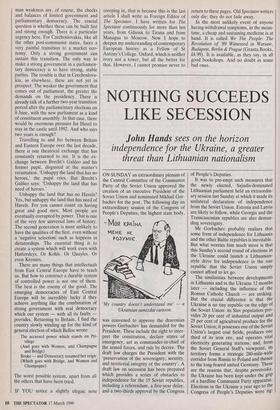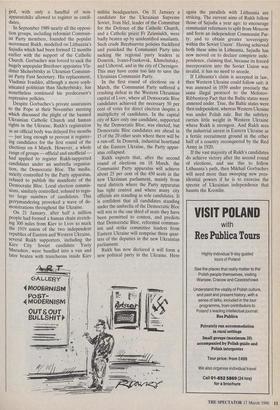NOTHING SUCCEEDS LIKE SECESSION
John Hands sees on the horizon independence for the Ukraine, a greater threat than Lithuanian nationalism
ON SUNDAY an extraordinary plenum of the Central Committee of the Communist Party of the Soviet Union approved the creation of an executive President of the Soviet Union and nominated Mikhail Gor- bachev for the post. The following day an extraordinary session of the Congress of People's Deputies, the highest state body, `My country doesn't understand me' — a Ukrainian samizdat cartoon.
was convened to approve the draconian powers Gorbachev has demanded for the President. These include the right to inter- pret the constitution, declare states of emergency, act as commander-in-chief of the armed forces, and rule by decree. The draft law charges the President with the `preservation of the sovereignty, security, and territorial integrity of the country', A draft law on secession has been prepared which provides a series of obstacles to independence for the 15 Soviet republics, including a referendum, a five-year delay, and a two-thirds approval by the Congress of People's Deputies.
It was to pre-empt such measures that the newly elected, Sajudis-dominated Lithuanian parliament held an extraordin- ary session last Sunday at which it made its unilateral declaration of independence from the Soviet Union. Estonia and Latvia are likely to follow, while Georgia and the Transcaucasian republics are also deman- ding sovereignty.
Mr Gorbachev probably realises that some form of independence for Lithuania and the other Baltic republics is inevitable. But what worries him much more is that this Sunday's second round of elections in the Ukraine could launch a Lithuanian- style drive for independence in the one republic that the Soviet Union simply cannot afford to let go.
The similarities between developments in Lithuania and in the Ukraine 12 months later — including the influence of the Roman Catholic Church — are striking. But the crucial difference is that the Ukraine is no tiny republic on the edge of the Soviet Union: its Slav population pro- vides 20 per cent of industrial output and 25 per cent of agricultural produce for the Soviet Union; it possesses one of the Soviet Union's largest coal fields, produces one third of its iron ore, and operates vital electricity generating stations; and, from the Soviet General Staff's viewpoint, its territory forms a strategic 280-mile-wide corridor from Russia to Poland and thence to the long-feared united Germany. These are the reasons that, despite perestroika, the Ukraine has been kept under the grip of a hardline Communist Party apparatus. Elections in the Ukraine a year ago to the Congress of People's Deputies were rig- ged, with only a handful of non- apparatchiks allowed to register as candi- dates.
In September 1989 nearly all the opposi- tion groups, including reformist Commun- ist Party members, founded the popular movement Rukh, modelled on Lithuania's Sajudis which had been formed 12 months earlier with the support of the Catholic Church. Gorbachev was forced to sack the hugely unpopular Brezhnev appointee Vla- dimir Shcherbitsky as Ukranian Commun- ist Party First Secretary. His replacement, Vladimir Ivashko, although a more soph- isticated politician than Shcherbitsky, has nonetheless continued his predecessor's repressive policies.
Despite Gorbachev's private assurances to the Pope at their November meeting which discussed the plight of the banned Ukrainian Catholic Church and human rights in the Ukraine, Rukh's registration as an official body was delayed five months — just long enough to prevent it register- ing candidates for the first round of the elections on 4 March. However, a whole range of groups — official and unofficial had applied to register Rukh-supported candidates under an umbrella organisa- tion, the Democratic Bloc. The media, strictly controlled by the Party apparatus, refused to publish the manifesto of the Democratic Bloc. Local election commis- sions, similarly controlled, refused to regis- ter large numbers of candidates. This gerrymandering provoked a wave of de- monstrations throughout the Ukraine. On 21 January, after half a million people had formed a human chain stretch- ing 300 miles from Kiev to Lvov to mark the 1919 union of the two independent republics of Eastern and Western Ukraine, several Rukh supporters, including the Kiev City Soviet candidate Yuriy Murashov, were bundled into a van and later beaten with truncheons inside Kiev militia headquarters. On 31 January a candidate for the Ukrainian Supreme Soviet, Ivan Hel, leader of the Committee for the Defence of the Catholic Church, and a Catholic priest Fr Zeleniukh, were badly beaten up by unidentified assailants. Such crude Brezhnevite policies backfired and panicked the Communist Party into sacking the regional party leaders in Donetsk, Ivano-Frankovsk, Khmelnitsky, and Uzhorod, and in the city of Chernigov. This may have come too late to save the Ukrainian Communist Party.
In the first round of elections on 4 March, the Communist Party suffered a crushing defeat in the Western Ukrainian capital of Lvov, where all Democratic Bloc candidates achieved the necessary 50 per cent of votes for direct election despite a multiplicity of candidates. In the capital city of Kiev only one candidate, supported by the Democratic Bloc, was elected, but Democratic Bloc candidates are ahead in 15 of the 20 other seats where there will be a run-off. In Donetsk, industrial heartland of the Eastern Ukraine, the Party appar- atus collapsed.
Rukh expects that, after the second round of elections on 18 March, the Communist Party apparatus will achieve about 25 per cent of the 450 seats in the new Ukrainian parliament, mainly from rural districts where the Party apparatus has tight control and where many city officials are standing as sole candidates. It is confident that all candidates standing under the umbrella of the Democratic Bloc will win in the one third of seats they have been permitted to contest, and predicts that Democratic Bloc, reformist commun- ists and strike committee leaders from Eastern Ukraine will comprise three quar- ters of the deputies in the new Ukrainian parliament. Rukh has now declared it will form a new political party in the Ukraine. Here again the parallels with Lithuania are striking. The current aims of Rukh follow those of Sajudis a year ago: to encourage communist reformers to split from Moscow and form an independent Communist Par- ty; and to obtain greater 'sovereignty within the Soviet Union'. Having achieved both these aims in Lithuania, Sajudis has now moved on to declare complete inde- pendence, claiming that, because its forced incorporation into the Soviet Union was invalid, it has no need to secede.
If Lithuania's claim is accepted in law, then Western Ukraine could follow suit: it was annexed in 1939 under precisely the same illegal protocol to the Molotov- Ribbentrop Pact that the Baltic states were annexed under. True, the Baltic states were then independent, whereas Western Ukraine was under Polish rule. But the subtlety carries little weight in Western Ukraine where Rukh is strongest. And Rukh sees the industrial unrest in Eastern Ukraine as a fertile recruitment ground in the other half of a country reconquered by the Red Army in 1920.
If the vast majority of Rukh's candidates do achieve victory after the second round of elections, and use this to follow Lithuania's path, then Mikhail Gorbachev will need more than sweeping new pres- idential powers if he is to exorcise the spectre of Ukrainian independence that haunts the Kremlin.



























































 Previous page
Previous page